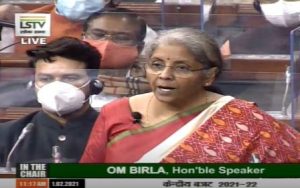Budget 2021-22: Increased Expenditure on Healthcare; Minimum Wage for All
FM Nirmala Sitharaman's COVID-19 budget introduced several reforms in the healthcare sector, railway, road infrastructure and pushed for privatisation.
It was amid ravening slogans of ‘Jai Jawan Jai Kisan’ from fellow parliamentarians, that Finance Minister Nirmala Sitharaman introduced the Union Budget for 2021-22. The government, this year, introduced several reforms in the healthcare sector, railway sector, road infrastructure, and pushed for increased privatisation. This was also the first budget to allocate Rs. 2,217 crores for tackling air pollution in 32 urban centres. 
Her third budget in a row, Sitharaman kick-started her two-hour speech by tipping her hat to the essential workers for their dedication in fighting the COVID-19 pandemic. She reiterated the endeavours brought forth by the government during the peak of the virus in 2020 through the Prime Minister Gareeb Kalyan Yojana Scheme. “Sitting at Rs. 2.76 lakh crores, the scheme was able to provide free food grains to 800 million citizens, free cooking gas to 80 million families, and direct cash transfer to a large population,” she added.
She also recalled the Atmanirbhar Bharat package and estimated its total impact at Rs. 27.1 lakh crores, also stating that these financial packages, introduced in an ongoing pandemic, were like 5 mini budgets. This year, she added, the budget was shaped around by six pillars: Health and well being, Innovation and R&D, Physical and financial capital and Infrastructure, Inclusive development for aspirational India, Reinvigorating human capital, and Minimum government and maximum governance.
With added anxiety of a virus hanging over, this year also saw a large part of the budgetary allocation reserved for the healthcare sector, Rs. 2.23 lakh crores, a tremendous increase from Rs. 69,000 crore last year. Rs. 35,000 crores of this sum is being reserved for the development of COVID-19 vaccines this year, she said, while also hinting at the development of 2 new vaccines for the country.
The Union government also introduced the PM Atmanirbhar Swasth Bharat Yojana and allocated Rs. 64,000 crores to the scheme.
Expanding over six years, the scheme will concentrate on primary, secondary, and tertiary care. Sitharaman added that it would strengthen existing national healthcare institutions, and will look at emerging diseases.
Also Read : Creation of PBO would Show India’s Maturation as a Democracy: Sahir Khan
In the field of agriculture, the FM assured that they were committed to the welfare of the farmers. “MSP has gone up. In the case of wheat, while Rs. 13,000 crores were paid to farmers in 2013-14, it increased to Rs. 75,000 crores in 2020-21,” she added. The amount given to farmers for other crops such as paddy, pulses, and cotton also saw an increase.
As for the migrant labourers, who bore the brunt of the pandemic, she reiterated the implementation of One Nation One Ration Card scheme. “Migrant labourers can claim ration even when they are far away from home. Their families at home can also claim it in their native areas,” she said while adding that the scheme has covered 86 per cent of beneficiaries. She also said that minimum wagers will now apply to all categories of workers, and women will be allowed to work in all categories and night shifts with appropriate protection.
Here are a few notable highlights of the Union Budget 2021-22:
– 7 textile parks will be established in the next three years.
– Government to sell a part share in the Life Insurance Corporation of India through initial public offering (IPO)
– Highways to be funded in West Bengal, Kerala, and Assam; government aims to complete development f 11,000 km of highways.
– 100 per cent electrification of broad gauge network by 2023.
– Metro Lite and Metro Neo to be kick-started as a cheaper way of travel in tier 2 cities and peripheral areas of tier 3 cities.
– Ports will now be managed in partnership with the private sector.
– Foreign direct investment to be increased to 74 per cent in insurance.
-More than 15,000 schools will be strengthened to include the National Education Policy.
– 3768 crores allocated to the upcoming census in 2022–23.
– Citizens aged 75 and above, and earning only a pension, to be exempted from paying taxes.
– 1.10 lakh crores allocated towards railways; western and eastern freight corridors to be developed.
